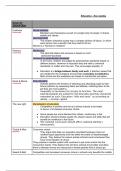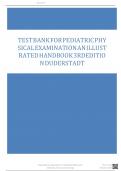ROLE OF
EDUCATION
Durkheim Social solidarity
functionalist
- Members see themselves as part of a single body of people. It shares
beliefs and values.
Specialist skills
- The modern industrial society has a complex division of labour, in which
each person has a specific role they need to fill out.
School is a “Society in miniature”
Parsons Meritocracy
functionalist
- The idea that status and success is based on merit.
(achieved>ascribed)
Universal vs particularistic standards
- In the home, children are judged by particularistic standards based on
different factors. However in education they are held to universal
standards no matter who they are. This encourages equality. m
● Education is a bridge between family and work. It teaches values that
are needed for the workplace and provides secondary socialisation.
Both school and the workplace are based on meritocratic principles .
Davis & Moore Role allocation
functionalist
- Schools perform the function of selecting and allocating pupils to their
future positions by assessing talent and attitude; matching them to the
job they are most suited to.
- Inequality is necessary for society to function. The most
talented people are suited for the best jobs and they should be
rewarded as such. Education “sifts and sorts” us according to
ability. → human capital
The new right Marketisation of education
- Competition is positive and fair as it drives schools to be better
- In favour of increased consumer choice
● Some people are more talented than others- meritocracy is fair.
● Education should socialise pupils into shared values and skills that will
benefit the workforce in the future.
● The national curriculum should affirm national identity→
ethnocentric.
Chubb & Moe Consumer choice
Neoliberal
- They argue that state run education has failed because it has not
created equal opportunity and has failed the needs of disadvantaged
groups. They believe the reason private schools excel is because they
have more freedom of choice
They propose a market system with vouchers to put more control into the
consumer's hands. They believe this will drive schools to be better and allow
them to allocate money and resources to where parents think it should go.
Gewitz & Ball Competition and increased consumer choice in schools only benefits the middle
, class due to their economic and cultural capital.
Athulsser Repressive state apparatus- the police force, courts, army etc.
marxist
Ideological state apparatus- education, media, religion etc.
- They argue these both help the bourgeoisie maintain rule.
He argues that the education system reproduces and legitimates class
inequalities
Bowles & Gintis Study - schools associated certain behavioural traits with success. E.g discipline
marxist
and obedience correlated to success.
Correspondence principle
- The education system mirrors the world of work. E.g accepting hierarchy,
competition, working for extrinsic rewards.
They argue that in schools the correspondence principle is taught through the
hidden curriculum.
- Myth of meritocracy- justifies the actions and means of the upper classes
and intends to keep people at the bottom of the class system. The idea
of meritocracy creates false class consciousness.
Working class inequalities are intentionally perpetuated to serve the needs of
capitalism.
Willis Study- learning to labour →The “lads” - anti school subculture
neo-marxist
● Found that although this group of people challenged and opposed the
school system by acts of rebellion, they still end up in the low skilled
jobs. Their hate for school has let them become accustomed to
boredom. This means they won’t strive for better jobs because they
dislike the idea of educational work. On top of this, their rebellion meant
they had bad grades and couldn’t obtain qualifications.
CLASS Cd→ cultural deprivation
EXTERNAL Md→ material deprivation
Feinstein Language
Cd - The importance of language in primary socialisation. The use of difficult
and complex sentences in early childhood can affect the use of language
in adulthood.
Bernstein Speech codes
Cd - Restricted code→ typically used by the working class. Limited
vocabulary, often unfinished grammatically incorrect sentences.
Context bound, simple sentences.
- Elaborated code→ typically used by the middle classes. Broad
vocabulary, grammatically complex sentences. Communicates
abstract ideas. Context free.
He argues that the elaborated code is used in schools, as education operates on
middle class values. Elaborated code is deemed “correct”, and it is favoured.
This means that middle class students will have an advantage as they would
already feel “at home”. This can lead to working class students feeling unwanted
and excluded.
Douglas Parents education



